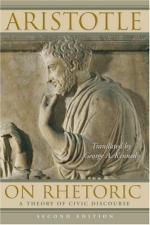|
This section contains 1,165 words (approx. 3 pages at 400 words per page) |

|
Book II, Chapters 12-22 Summary and Analysis
Chapter 12: The feelings which men are likely to have, and the virtues which they are likely to possess, depend in great deal upon their circumstances, like their age, good or bad birth, wealth, and power. The lifetime of a man can be divided into three general periods, namely, his youth, the prime of his life, and his old age. Young men, generally speaking, tend to be active and forward-looking, for they have not had a life long enough to look back on. They tend to be especially sensitive to carnal pleasures, especially of the sexual variety, and are often overly bold and courageous because they have not yet discovered how difficult life can be.
Chapter 13: Old men, on the other hand, are in many ways the opposite of young men. Their minds are constantly stuck...
(read more from the Book II, Chapters 12-22 Summary)
|
This section contains 1,165 words (approx. 3 pages at 400 words per page) |

|




